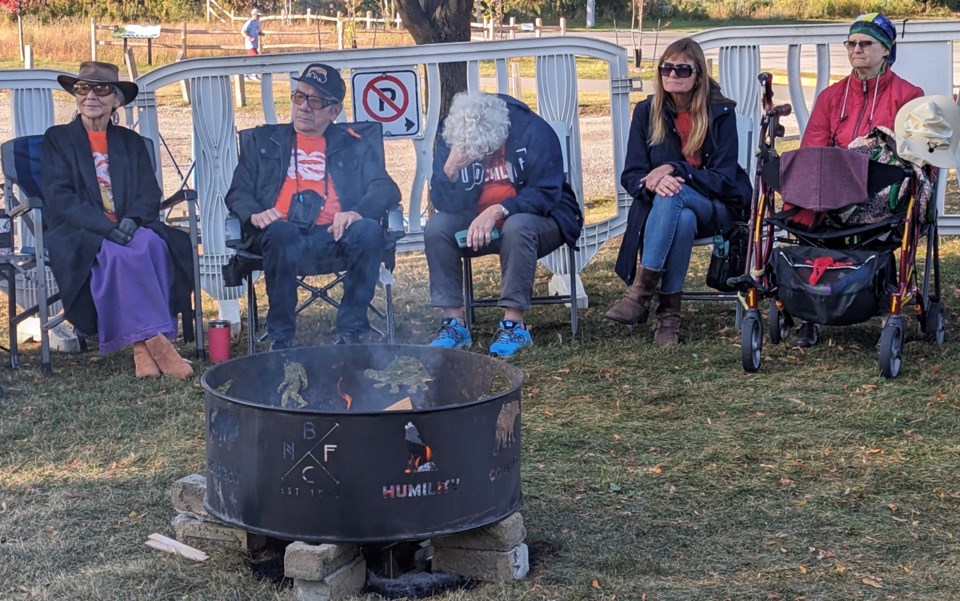Around the Sacred Fire and Sharing Circle, there were gatherings Saturday to mark the third annual National Day for Truth and Reconciliation, near the Spirit Catcher on Barrie’s waterfront.
Jeremy Cote, 44, a Barrie resident originally from Rama First Nation, said the day was about everybody coming together and living in harmony with each other.
“It can be done; it just takes that effort to move forward together, to where we need to be and in the future. I look at it for my kids and the next generations coming ahead. We need to set examples and move forward with everybody, not just certain people,” he said.
“So, coming here today and having our elders talk, share their stories (of) residential school and the traumas that they went through and the families who still pick up that trauma from them … it’s all that coming together, moving forward and living in a good way.”
Painted Sky, 50, from Barrie, and said truth and reconciliation is a process.
“We’re here today to honour our ancestors, our elders, to acknowledge truth and reconciliation. It’s about healing. It’s about community getting together, awareness and sharing, to honour those who have passed,” he said.
“We’re also here to honour our parents, our grandparents. My wife is here today to honour her mother and her dad, and I’m here to honour my dad, and my mother, too, as well as my grandparents, so I acknowledge the ones who have passed.
“We’re all here to congregate and pray and to heal. Every day is healing.”
Painted Sky said Saturday is also about the Truth and Reconciliation Commission’s calls to action.
“We still have a long way to go, because there happens to be 94 calls to action. But we have to remember only 10 per cent of that has been implemented and changed, so we still have a long process,” he said.
“We hope, as Indigenous people, that it’s going to exceed that, to acknowledge all 94 calls to action because we need that. That’s a start. It’s a good way of healing.”
He also acknowledged the thousands of children buried near former residential schools.
“But there happens to be more children that we’ve found,” he said.
Mike Culver, 54, from Oneida First Nation, near London, said the National Day for Truth and Reconciliation Day is important to him and his family.
“My mother was a ’60s Scoop. She was taken by federal agents just after birth, and so we were basically disconnected from our culture,” he said of the removal of children from their families and communities. “So, it really felt like a loss in my whole time growing up and, the same with my mother and my sister.
“(We were) not being able to identify with ourselves. She (mother) did eventually find her family when I was a teenager, but even though now we know our family, our culture, it’s still hard to connect with them.”
He said it’s about being where people belong, and how awkward it is to grow up when they don’t know that.
“Today helps. It’s basically a recognition. I’m also a big promoter of mental health. And this goes along with your self-ego, how you believe in yourself, and I would probably recognize a lot of Indigenous people who’ve been misplaced,” Culver said.
“I have a feeling of that disconnection. It really makes you feel small and humble. Society has a bold feature to it where you want to stand out and promote yourself and take charge of life, but growing up, feeling small and like you don’t belong, it really kind of subverts your voice, makes you kind of quiet.”
So, the National Day for Truth and Reconciliation Day helps Indigenous peoples who have been displaced, or are just feeling small, Culver said.
“This actually brings out a recognition, helps us feel like we belong, that society accepts us for who we are. It doesn’t repair the past, but it helps to move us along and to possibly repair the future so we have a bright path and future, inclusion, acceptance,” he said.
“It actually feels kind of nice and warm to have society come and recognize that we’ve been kind of stuck under the rug a little bit, and so it’s kind of a nice feeling.”
The Sacred Fire and Sharing Circle were hosted by the Barrie Native Friendship Centre and honoured all those affected by residential schools for a day of prayer, shared stories, learning and healing. Throughout the day, guests joined the circle to share their thoughts and experiences.
The Every Child Matters flag was raised Friday at Barrie City Hall to honour those affected by residential schools, and smaller flags adorned the sharing circle on Saturday.
The first National Day for Truth and Reconciliation was held Sept. 30, 2021, after the identification of unmarked burials at former residential school sites across Canada.



